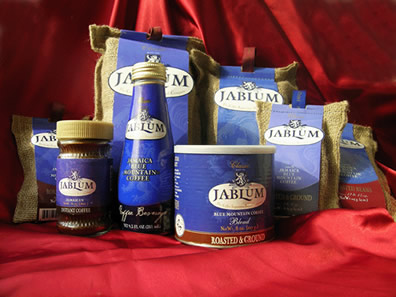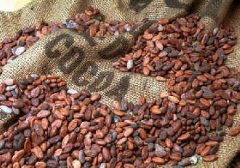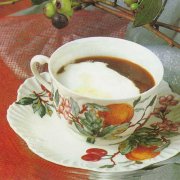Excellent Blue Mountain Coffee authentic Jamaican Blue Mountain Coffee Brand

Gourmet Blue Mountain Coffee (JABLUM) is an authentic Jamaican Blue Mountain Coffee brand with a long history, which is produced by the Mavisban Coffee Company, which accounts for 40% of Jamaica's Blue Mountain Coffee production every year.
Blue Mountain Coffee, produced in the Blue Mountains of Jamaica, is famous all over the world for its unique excellent quality. The Blue Mountains are located in the east of the island of Jamaica. Whenever the weather is clear, the sun shines on the Caribbean. The mountains on the island seem to be shrouded in a faint blue fog because of the refraction of the sea, hence the name "Blue Mountain".
The Blue Mountain has fertile volcanic soil, rainy all the year round, fresh air and a large temperature difference between day and night, which is very suitable for the growth of coffee trees. However, only coffee grown in the blue mountain area above 1800 meters above sea level can be counted as authentic blue mountain coffee.
It is said that as early as 1725, the Frenchman Sir Nicholas Rawls brought the first coffee trees from Martinique to Jamaica and planted them in the St. Andrews area of the Blue Mountains. Later, among the refugees in exile from Haiti, there were coffee farmers who settled in the Blue Mountains and brought coffee growing technology there. Gradually, St. Andrew became one of the three major producing areas of Blue Mountain Coffee (the other two are Portland and St. Thomas). In 1838, Jamaica abolished slavery and allowed liberated slaves to cultivate their own land. Free slaves moved to the mountains to grow coffee and exported it to England. By the 1930s, Jamaican coffee production peaked at 15000 tons a year.
By the middle of the last century, however, the quality of Blue Mountain Coffee had declined and foreign buyers refused to renew their contracts. To this end, the Government of Jamaica established the Coffee Industry Committee to save the fate of top coffee. In 1969, Japan began to provide huge investment to Jamaican coffee growers and was willing to pay a deposit for Blue Mountain Coffee, so that the output and processing quality of Blue Mountain Coffee were gradually restored. Because of this, 90% of blue mountain coffee is shipped to japan every year, and other countries can only bid for the remaining 10%, that is, about 3500 barrels (70 kg per barrel) of blue mountain coffee.
The cultivation and processing of the gourmet Blue Mountain Coffee is very exquisite, and every step of it goes through the stringent quality management of Jamaica Coffee Industry Bureau, such as seedling, fertilizer, harvest, cleaning, baking, packaging, etc., all in strict accordance with the relevant regulations. Only by passing the standard identification can we finally obtain the inspection certificate of "Blue Mountain Coffee" issued by the Jamaican Coffee Bureau. The caffeine content of this coffee is very low, less than half that of other coffees, and its taste contains all the advantages of coffee. It has a strong flavor, a smooth taste, a perfect blend of mellow, sweet, sour and bitter, and a long finish.
Blue Mountain coffee is shipped in wooden barrels, and Jamaica is the last country to still use this traditional packaging method. Since the production of Jamaican coffee is not large, only about 40,000 bags (60 kilograms each) each year, the gourmet Blue Mountain coffee has become particularly precious. (Liu Xin)
Important Notice :
前街咖啡 FrontStreet Coffee has moved to new addredd:
FrontStreet Coffee Address: 315,Donghua East Road,GuangZhou
Tel:020 38364473
- Prev

The three realms of drinking coffee are like the different realms of tasting life.
I think drinking coffee is really like tasting the different realms of life. The need for sugar and milk is like childhood. Fruit candy, chocolate, cake and ice cream are favorites at this time. The strong, sweet taste is like the warm and bright color on the canvas of life. At this age, there is no time, no patience, and no disdain to taste anything other than sweet.
- Next

The rarest cat dung coffee Kopi Luwak in the world
For coffee lovers, drinking a cup of Jamaica's Blue Mountain is nothing special, but if you can drink a cup of Kopi Luwak (also known as civet coffee), you will have no regrets for the rest of your life. This kind of coffee is called the most fragrant poop since there is shit. Although its name is not very elegant, it is a fact. It was pulled out by a kind of arboreal wild animal called musk cat on the island of Sumatra, Indonesia.
Related
- Beginners will see the "Coffee pull flower" guide!
- What is the difference between ice blog purified milk and ordinary milk coffee?
- Why is the Philippines the largest producer of crops in Liberia?
- For coffee extraction, should the fine powder be retained?
- How does extracted espresso fill pressed powder? How much strength does it take to press the powder?
- How to make jasmine cold extract coffee? Is the jasmine + latte good?
- Will this little toy really make the coffee taste better? How does Lily Drip affect coffee extraction?
- Will the action of slapping the filter cup also affect coffee extraction?
- What's the difference between powder-to-water ratio and powder-to-liquid ratio?
- What is the Ethiopian local species? What does it have to do with Heirloom native species?

